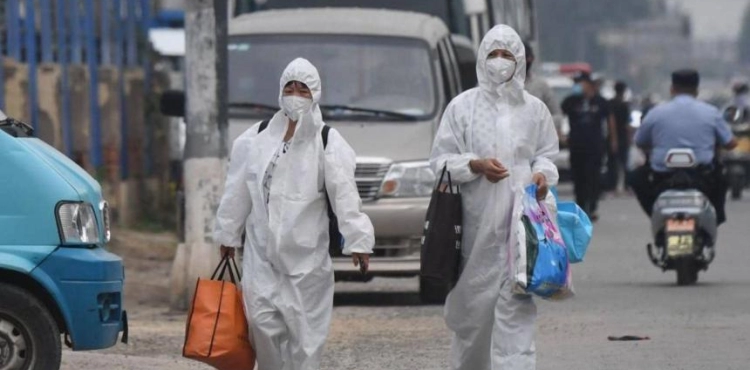China revealed on Sunday the increase in the number of new infections with Covid-19, which raised fears of a second epidemic wave at a time when European countries are preparing to open their borders again after the emergence of indicators to control the disease.
The Chinese authorities announced the discovery of 57 new cases of the virus in 24 hours, including 36 linked to a large market in Beijing, the highest daily toll since April.
The news is worrying for the rest of the world, as it highlights the difficulty of controlling a pandemic still sweeping Latin America, Iran and India.
China was in the process of recovering its recovery from the epidemic that emerged at the end of last year in Wuhan (center), using measures ranging from protective masks to the approval of closure and isolation.
But with the emergence of a new epicenter of the emerging coronavirus in the Shinfadi market, which provides fresh food within the capital, the authorities are quick to take a series of measures.
So 24 centers began conducting medical examinations, which included ten thousand people, which allowed the detection of 24 injuries Sunday.
The authorities are looking for checks for 46,000 people who live in hedges in the market, as well as for workers within them, and have started tracking those who recently visited them.
"I went to the market, so I want to make sure I don´t get hurt," said the 30-year-old Gyo, while waiting for her turn to undergo a medical examination.
Among the injured reported Sunday, a 56-year-old man works as a bus driver at the airport and visits the marketplace before he feels caught.
The authorities subjected 11 residential areas surrounding the place to isolation, while police officers wearing masks closed part of the market.
In an indication that control of the epidemic is still difficult, Iran announced on Sunday more than 100 deaths as a result of infection with Covid-19 in 24 hours, in an outcome that the country had not recorded in two months and raising the total number of deaths to 8,837.
"It is a brutal and unpredictable virus that can surprise us at any moment," said a spokeswoman for the Iranian Ministry of Health, which is considered the most affected by the outbreak in the Middle East.
The epidemic has put health systems around the world in front of an examination of their capabilities, especially in India, where the media said many patients die outside hospitalized beds. More than a thousand injuries are recorded daily in New Delhi.
The daughter of Ashwani Jayen, a trader in New Delhi in the mid-1940s, recounts that her father died alongside her in an ambulance while searching in vain for a hospital receiving him. "They don´t care if we live or die," says the 20-year-old.
In India, which has officially registered nearly nine thousand deaths and more than 300 thousand injuries, morgue corpses are crowded due to the inability of landfill and incinerator workers to keep up with the path of death.
Concern prevails in China at a time when Germany, Belgium, France and Greece are regaining in Europe, where the disease is clearly receding, freedom of movement Monday morning with all European Union countries. Austria will do the same at midnight, Monday, Tuesday.
Spain also brought this measure closer to June 21, after it was scheduled for July 1, but it excluded its land borders with Portugal.
In France, President Emmanuel Macron will deliver a speech on Sunday evening at a time when calls have doubled in recent days in the country to accelerate the process of lifting the isolation measures. The epidemic has claimed 29,398 people, but the number of infected people is constantly declining.
In Italy, which opened its borders on June 3, two new hotbeds of disease were discovered in recent days in Rome, the first in a hospital and the second in a building where a stone was forced.
The epidemic has now become the focus of Latin America, where the situation outside Brazil, that is, in countries such as Mexico and Chile, is worsening, while the hospital system in Honduras appears "on the verge of collapse," according to the professor at the National University, Marco Tolio Medina.
With a total of 42,720 deaths as of Saturday evening, Brazil is the second most affected country in the world after the United States (115,347 deaths out of more than two million injuries).
Meanwhile, European football stadiums began to regain life at the end of the week, with competitions resuming in Italy, Spain and elsewhere, after three months of interruption.












